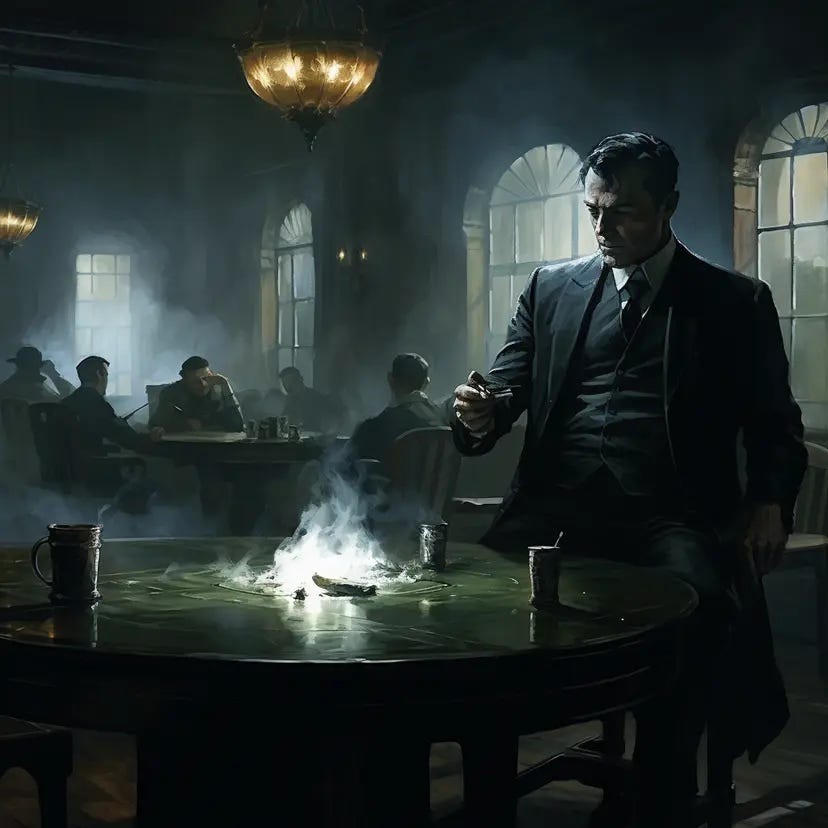
The contents burned before the toddies had cooled. The Herald’s reaction after Reading was mechanical: Memorize. Burn. Drink. This last part was his own ritual, not strictly protocol. The Couriers, always two, had declined their cups.
The missive was in Plain English, nothing fancy, nothing distinct. The Herald read newspapers in Plain English. He spoke to his wife and sang to his daughter in that mother tongue. But though the contents were in Plain English, he hadn’t understood a word. This was the way of Missives, and of Heralds.
His wife didn’t know he was a Herald. She didn’t know there were Heralds. She didn’t know there was a war on, and he would like to keep it that way.
He finished his drink as he recited the litany in his head, dwelling on the last step.
“Read. Memorize. Burn. Announce.”
He didn’t know why the Recipient alone understood the words he Announced. The Missives were in Plain English, just words.
Weren’t they?
Precious were Heralds. Most who tried could not Read, fewer still Memorize, only a handful Announce. The Herald had once told his Handler that Announcing reminded him of reciting poetry as a boy. Without understanding the meaning, the rhymes had yet danced across his tongue. He’d wondered if the effort had primed him.
“Might be, might’n it?” had said his Handler (“Coordinate. Watch. Listen. Hide.”) without curiosity.
The young didn’t learn poetry anymore. Society limped along, sloughing like snakeskin the parts the Occupiers didn’t need. Few bartenders remembered how to make hot toddies, most serving only a clear, bubbly tonic rich in booze but destitute of flavor. People drank it because the Occupier factories produced so much and thus it was cheap.
There were rumors that the same thing would be done for nurseries, soon. All children would be manufactured together, bubbly and flavorless. His daughter’s might be the last generation raised at home.
He put down his cup and looked around. The bartender was grimacing at the smoking ashes and the Couriers’ untouched cups.
But the man would have to content himself with mystery because the Chain of Custody was ingenious. Before the Couriers (“Pair. Accept. Find. Deliver.”) were the Encoders. The Herald didn’t know their watchwords, nor who preceded them.
It was safer that way. If the bartender had asked him what was in the Missive, he wouldn’t be able to tell him. If he asked him where the Couriers came from, he wouldn’t know. If he asked who had written it, even had he threatened using one of the Occupier’s weapons, the Herald would die without betrayal.
He hoped it wouldn’t come to that. There were few Heralds and many Missives.
The Herald walked out to the street. It was mid-afternoon, well before curfew, and people thronged to market. The once-winding lanes had been made straight to accommodate the Occupiers, with their metal suits and weapons that melted flesh. There were a few of them about, walking in pairs just like the Couriers.
Like his wife, the Occupiers didn’t know there was a war on. They thought they’d already won it. One day they would know differently.
The Missive told him where to go. Oh, there hadn’t been a map. But his mind knew. It had Memorized, and now it knew the way. He would approach the Recipient and Announce.
His path led him to his own district. Announcing so close to home made him nervous. What if his wife saw him? She thought he worked in an office by the wharves. She would jump to all the wrong conclusions.
He approached a door. Knocking wasn’t part of protocol because it wasn’t always needed or advisable. In this case, it was completely unnecessary.
Heart in his stomach, The Herald unlocked the door and took off his shoes, placing them on a scuffed rack. He heard banging pots in the kitchen, and the smell of roast. It would be ready for five o’clock dinner. If the clanging stopped, his footsteps would be heard. Never had he been given a more perilous mission.
He walked upstairs. How many times had he done this? Sing, Muse, he thought, of the soft floral wallpaper, the worn carpeting, the splotch of spilled coffee that refused to be scrubbed out.
He opened the door at the far end of the hall and faced the solemn eyes of the Recipient.
The Herald Announced. The words – they were words – he didn’t understand, and forgot each as it was spoken. But the Recipient must have liked what she heard, for she gave a high, delighted shriek and stretched out her hands.
He crossed the narrow divide to her crib and cradled his daughter. She was bath-pinked, smelling of the powder that had been in short supply since the occupation. His wife always found more, somehow.
The Missive he had given his infant daughter would be key to a future without Occupiers. It was one of thousands of Missives, and this one was hers to use, someday.
He instructed his daughter in the sole duty of a Recipient.
“Remember,” he said to her with a kiss.



